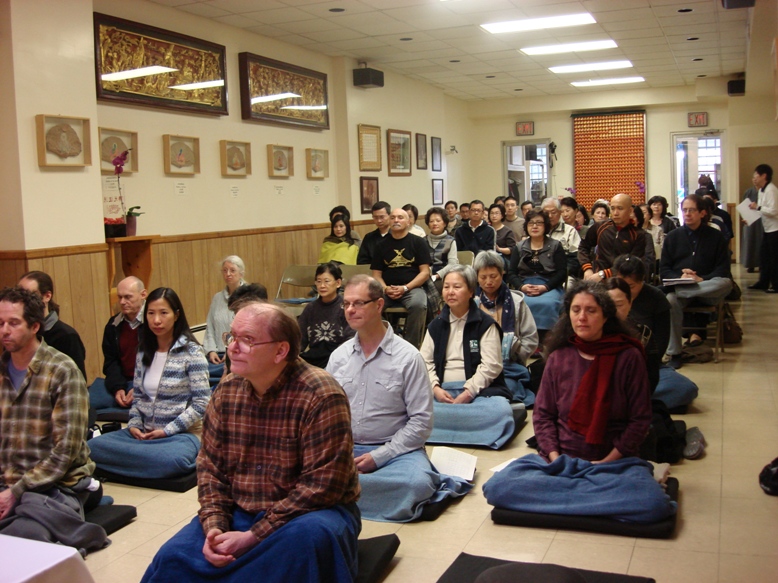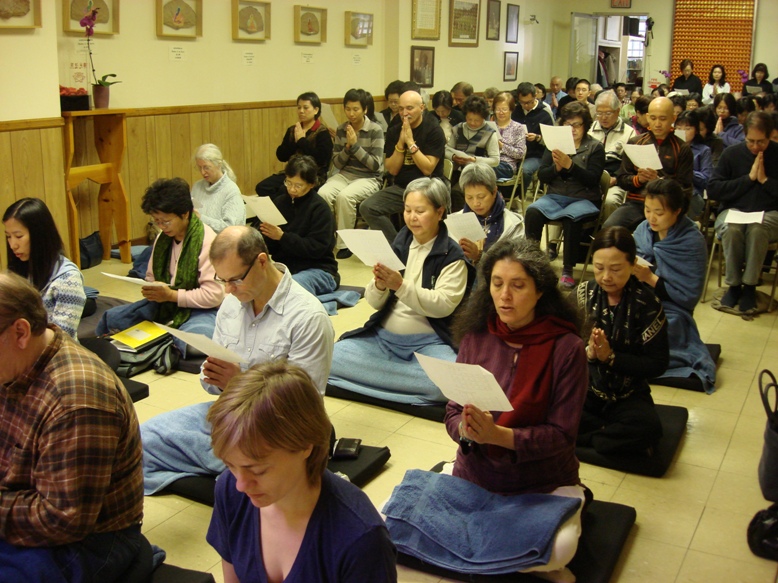| |

Chan Series - Part 4
The Raining Blossoms From A Goddess:
Seeing Perfection in Imperfection
By Chang Jie
03/08/2009

On Sunday, March 8, 2009, Venerable Guo Xing, Abbot of Chan Meditation Center and Dharma Drum Retreat Center,
continued the dharma talk series on Chan with a talk entitled, "The Raining Blossoms From A Goddess: Seeing
Perfection in Imperfection".
The title of this talk refers to Chapter 7 of the Vimalakirti Sutra, where a goddess, after hearing the dharma,
uses her supernatural powers to rain heavenly flowers on the bodhisattvas and the Buddha's great disciples.
The flowers fall off the bodies of the bodhisattvas but cling on the disciples, despite their efforts to shake
them off. For the disciples, having flowers on their bodies would be contrary to the Buddha’s teachings. This
kind of mindset shows their mind of differentiation.

Venerable told this story to illustrate how our daily problems and vexations arise from the mind of differentiation.
We create our problems and want to get rid of our problems, but don't see that we ourselves have created the problem.
When the mind arises, all kinds of phenomena arise. When the mind diminishes, all kinds of phenomena diminish. When
we have thoughts of anger, we are in the realm of hell. When we have thoughts of ignorance, we are in the animal realm.
When our thoughts are of compassion, we are in the realm of heavenly beings. When our thoughts are pure, our perception
of the environment is pure. Thus, all phenomena that we perceive are created by the mind. Everything is mind. Mind is
phenomena. In the "Heart Sutra", it says
Form is precisely emptiness,
Emptiness precisely form.
Mind and emptiness are the same. Mind and wisdom are the same. Every phenomenon that arises does
not arise outside of the mind but inside the mind. When we grasp, we create dualistic mind. Once
we have dualistic mind, we create good and bad, and differentiate the self from others. Everything
is created by this mind of differentiation.

In imperfection, we see perfection. There is no such thing as perfection, because having perfection
means that imperfection exists. Within imperfection, both perfection and imperfection exist. So,
when we see perfection, is it perfection or imperfection? When it is neither perfection nor
imperfection, it is perfection.
Reference:
Vimalakirti Mirdes Sutra translated by Robert Thurman
http://www2.kenyon.edu/Depts/Religion/Fac/Adler/Reln260/Vimalakirti.htm
|
|